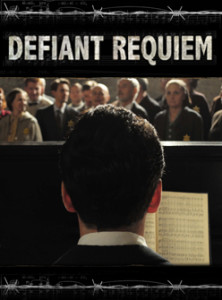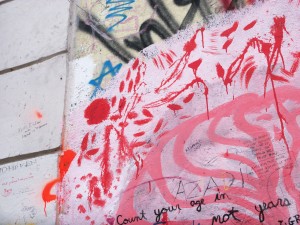Rafael was described as mild-mannered by those who knew him casually, but when it came to his music, he was passionate, determined and strong-willed. He also was a perfectionist who held incredibly high standards for himself and the members of his ensemble. All of these qualities would prove essential to his work at Terezin. When he was placed on a transport to Terezin in November 1941, Rafael brought with him several musical scores. One of these scores might seem an unusual choice: a requiem, or music for a Catholic funeral Mass, by the Italian composer Verdi. Yet this would be the vehicle for sending a message of defiance to the Nazis.

At Terezin, Rafael discovered an abandoned piano in the cold dank cellar of one of thebarracks. In the evenings, after a long day of physical labor, Rafael would go down to this cellar and rehearse his music. He invited other inmates to join him, and they would sing popular Czech songs as he accompanied them on the piano. Then Rafael decided to pursue an incredibly ambitious task: to take a chorus of more than one hundred amateur singers and train them to perform Verdi’s Requiem, widely considered one of the most difficult choral works in the world. Furthermore, the lyrics were in Latin and the only copy of the score was the one Rafael brought with him. The lyrics describe a day of judgement where God’s wrath is poured out on sinners, where all the powerful institutions that man has created are crushed to the ground. Rafi envisioned this score as a requiem for the Nazis, as he believed that one day they would face judgement for their crimes. To express this sentiment too explicitly would result in certain death, but Verdi’s Requiem was a way they could express it safely. There is also the hope of deliverance in the Requiem, which resonated with many singers.
After several months, the chorus had not mastered the Requiem to Rafael’s standards, but a pending transport threatened to take away many of the singers. And so, Rafael decided to go ahead and stage a performance of the Requiem for the Terezin inmates. By all accounts, it was a triumphant success, and gave the prisoners precious moments of freedom from the horrors of their surroundings. Tragically, the next morning, nearly half of Rafael’s singers were put on a transport to Auschwitz. But Rafael was determined not to surrender, and he found more singers to replace the ones he had lost. He ended up staging the Requiem about fifteen times, despite losing so many of his singers to transports. The final performance of Verdi’s Requiem conducted by Rafael Schachter occurred during the Red Cross visit to Terezin, at which many Nazis were in attendance. This was a powerful moment where the prisoners could look their captors in the eye and sing of their downfall. Tragically, the Nazis’ downfall failed to come soon enough.
Soon after the performance, the rest of the choir, including Rafael, were placed on a transport to Auschwitz. Most were murdered immediately on arrival. Rafael managed to survive Auschwitz, and several other camps, only to die on a death march in the spring of 1945, shortly before liberation. His legacy is his incredible contribution to the cultural life of Terezin, and most of all, his legendary performance of Verdi’s Requiem.
To learn more of Rafael Schachter and his Terezin singers, I recommend watching the powerful documentary Defiant Requiem, available on Netflix and Amazon. The documentary tells his story and follows a present-day choir which returns to perform the Requiem at Terezin, sending the message that the legacy of Rafik and his singers lives on.
Defiant Requiem Trailer


